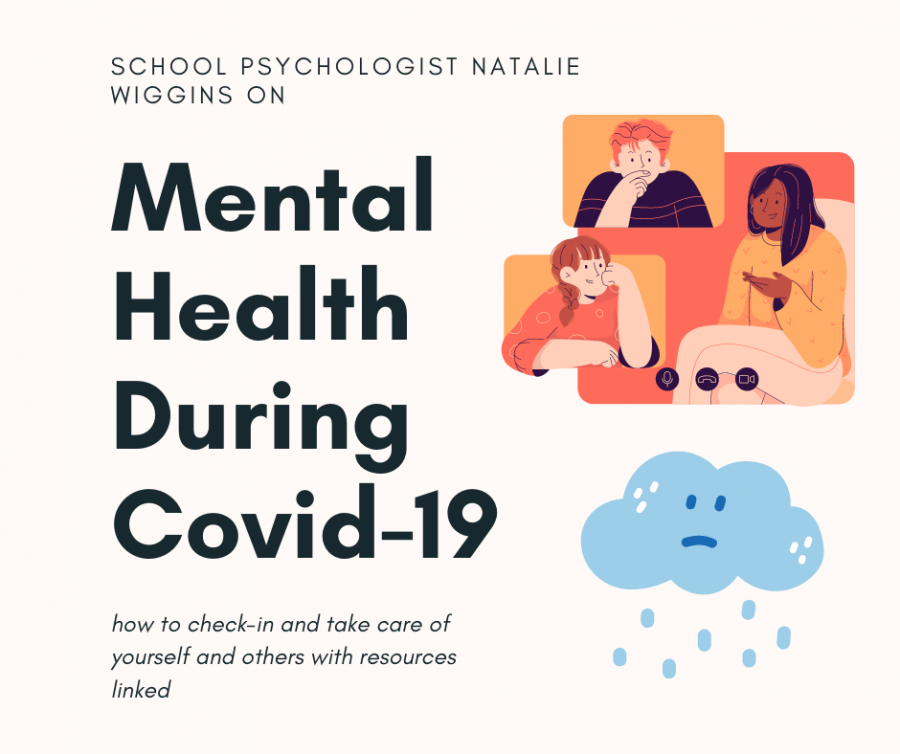Mental Health During the Pandemic with School Psychologist: Natalie Wiggins
Here are some things to keep in mind as you consider your own and others’ mental health during this difficult time.
January 31, 2021
Covid-19 has affected everyone by taking away many in-person activities like school, annual traditions, gatherings, and events for protection from the disease. But as we soon reach a year of social distancing, feelings of anxiety, stress, and loneliness can make their place in our individual lives.
When speaking to school psychologist, Natalie Wiggins, she discussed how the community has been affected by the pandemic and recent events, “I think it has led to people being more fearful and worrying more about their loved ones and the future of this country itself. Many people have experienced loss in one way or another. Some may have experienced loss of a job, loved ones, or loss of support services.” She also added how many of us are also experiencing the loss of time with loved ones due to social isolation.
Since the start of the pandemic, there has been a large increase in people experiencing mental health issues, with more feelings of sadness, change in sleeping patterns, ability to focus, eating habits, and so on. Wiggins says, “All of this is completely normal and no one should feel like they are alone in how they are feeling,” but to make sure to reach out to someone you trust to help work through this time.
But checking in with ourselves can be half the challenge, and it is important to consider how you feel and are taking care of yourself. Though self-care if often connected to facial masks and bubble baths, it can also mean more difficult things like maintaining/starting good eating habits, daily exercise or physical activity, practicing calming strategies (i.e., breathing exercises, mindfulness), and good sleeping habits (establish a consistent bedtime, getting 8-9 hours of sleep). Wiggins also adds that “taking time to do things we truly enjoy,” and “practicing gratitude can also help improve your mental and emotional health.”
While it can be really difficult to reach out for help, it is very important to do so, especially if you feel your negative emotions failing to resolve or getting worse. “Sometimes we need someone to help us work through our feelings and help us get through difficult situations. I believe that having a different perspective from someone else can help you grow and process things in a way that you may not be able to do on your own,” Wiggins explains. If you do need help, do not hesitate to reach out to a parent or a trusted adult, as they can help connect you to mental health professionals if it is something you need. “If you feel the need to reach out to an administrator, teacher, or student services member, please email or call us. We can try to provide you with some coping skills or connect you with the necessary resources. If you are experiencing a crisis or emergency, please call 911 or a hotline to get the help you need.” The link to school administrators and their contact information can be found here.
If you or someone you know of us in immediate need help, use the CDC recommends these helplines:
- National Suicide Prevention Lifeline: 1-800-273-8255 or call 911
- Substance Abuse and Mental Health Services Administration (SAMHSA) Disaster Distress hotline, 800-985-5990, or text TalkWithUs
- National Domestic Violence Hotline, 1-800-799-7233 (TTY: 1-800-787-3224)
It is also important to check-in with the people around us. Wiggins points out that, “it is especially important to check in with individuals that may live alone because they may truly feel isolated from everyone.” How you communicate with others can also make a difference, “I know that many of us like to simply text people, but there is power in a phone call or video call. We need to see peoples faces and hear their voice to truly know how they are doing. I think having deep and meaningful conversations makes a difference,” Wiggins discusses. Furthermore, make sure that when you are communicating with others, you are fully present, for five minutes of focused and present communication can end up becoming much more meaningful than thirty minutes of distracted conversation.
Lastly, it is important to go easy on yourself and the people around you during this time. Wiggins finishes by saying, “We are all experiencing something that we have never gone through before in our lives. I do not think anyone should feel ashamed if they are not functioning in the same way you used to before the pandemic. I cannot stress enough that if you are not feeling quite right or notice that those around you are struggling, please continue to take care of yourself, help uplift others, and encourage yourself and others to consistently seek support.”






